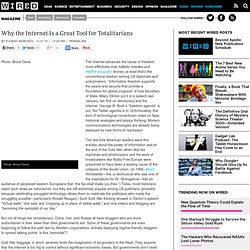

How the Internet strengthens dictatorships. How dictators watch us on the web. The internet is meant to help activists, enable democratic protest and weaken the grip of authoritarian regimes.

But it doesn’t—in fact, the web is a boon for bullies Read more in this debate: media guru, Clay Shirky, responds to Morozov’s criticisms and defends the web as a positive force for democracy. Morozov replies to Shirky here. Hear more: Evgeny Morozov speaks at Demos on the subject: “Is the internet really changing politics?” , and Prospect’s Tom Chatfield interviews Morozov here. My homeland of Belarus is an unlikely place for an internet revolution.
Its last presidential election in March 2006 was followed by a short-lived and unsuccessful revolution. Details of this rebellion have since been celebrated by a cadre of mostly western thinkers who believe that digital activism can help to topple authoritarian regimes. Enthusiasm for the idea of digital revolution abounds. At the hearing, I was the lonely voice of dissent in a sea of optimism. But the truth is often different. And So what? Prospect Magazine‘s latest issue figures an excellent piece by my witty colleague Evgeny Morozov.

Entitled “Why Dictators Love the Web,” the article is as an important contribution to the study of digital activism. As many in this field know, Evgeny is one of the lone analog voices countering the digital “Internet = Democracy” hype that pervades the mainstream media and much of digital activism. To this end, Evgeny’s latest tour de force is also invaluable for my dissertation research, in which I study the role of new media and technology in popular resistance against authoritarian regimes. I had lunch with Evgeny last week and I must say he is without doubt one of my favorite colleagues to discuss these issues with.
Why? In the meantime, I thought I’d dig a few digital trenches of my own around his really enjoyable piece in *Prospect which, just to be cheeky, might well have been titled “Why Evgeny Loves It that Dictators Love the Web.” So this is part of the problem, you see. My take? Response to the response. Twitter and Iran: First Get the Data, Then Talk. Why the Internet Is a Great Tool for Totalitarians. Photo: Brock Davis The Internet advances the cause of freedom more effectively than ballistic missiles and Hellfire-equipped drones; at least that’s the conventional wisdom among US diplomats and policymakers.

“Information freedom supports the peace and security that provide a foundation for global progress” is how Secretary of State Hillary Clinton put it in a speech last January, her first on democracy and the Internet. George W. Bush’s “freedom agenda” is out; the Twitter agenda is in. Unfortunately, this kind of technological romanticism relies on false historical analogies and sloppy thinking. The last time American leaders were this ecstatic about the power of information was at the end of the Cold War, when illicit fax machines and photocopiers and the work of broadcasters like Radio Free Europe were presumed to have been a leading cause of the collapse of the Soviet Union.
But not all blogs are revolutionary. This isn’t just theory. Why all the tricky techniques?